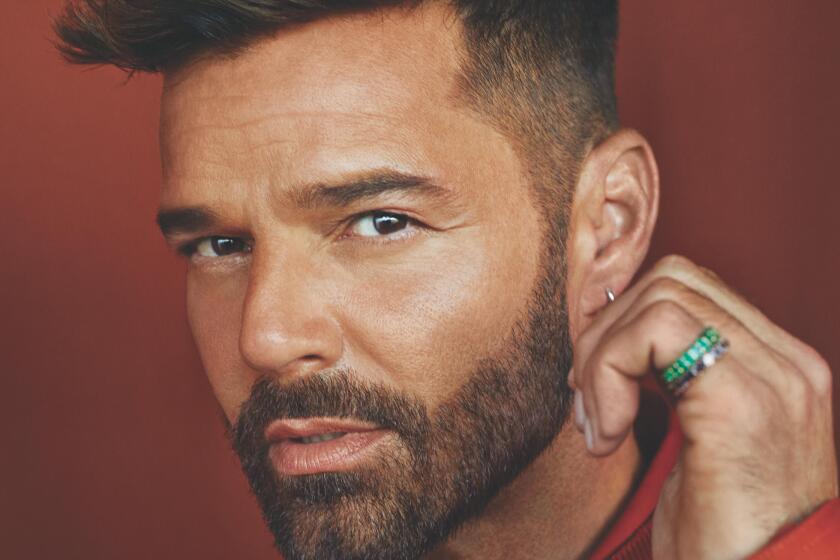SXSW 2014: Side Effect is first Myanmar band to play at festival
On March 15, while much of Austin, Texas, was drowning in music and marketing and thousands of tiny bands were running the streets trying to make a dent, history was being made on a little stage at B.D. Riley’s.
Chances are you didn’t hear about Side Effect’s landmark Thursday gig amid chatter about Lady Gaga’s vomit stunt, but the four-piece rock group are staking claim as the first band from Myanmar to perform at South by Southwest.
Theirs is a fascinating story, and confirm that for all the peaks and valleys most artists go through to land on an Austin stage, few have had to endure more hurdles than Side Effect.
First, a quick history lesson. Until 2011, Myanmar was under the rule of a military dictatorship notorious for its brutality, broad censorship practices and, most prominently from an international perspective, its role in keeping Nobel laureate and democracy advocate Aung San Suu Kyi under house arrest for years.
Recently, however, Myanmar (formerly known as Burma) has undergone a profound shift. In 2010 Suu Kyi was not only allowed to leave her Yangon home to travel and speak without restriction, but soon the ban on the political party she represented, the National League for Democracy, was lifted, allowing her to run for, and win, a spot in Parliament. She and others are guiding Myanmar in transition toward democracy. As a result, many international sanctions have been loosened, and the country is gradually adjusting to a new reality.
I sat down with singer and guitarist Darko C. of Side Effect and the rest of the band as South by Southwest was winding down. A hard, tight post-punk band, the members cite influences including the Strokes, White Stripes, Yeah Yeah Yeahs, Hot Hot Heat, Handsome Furs, Silversun Pickups and the Kooks as inspiration.
Side Effect had just returned from an overnight run to Houston, where they’d played a show for Myanmar ex-patriots. Below is an edited version of our conversation.
How did you end up in Austin? I know you had an online fundraising effort.
Darko C.: We haven’t gotten the money yet, so we borrowed the money from friends and we played a fundraising gig in Yangon on March 1. It was very last-minute. That gig was the one that made us in the position to come here.
It was a very hard decision to make, because all of our friends were suggesting, “You might end up in debt coming back. Why don’t you just finish the next album and put it out and you can go next time?” But we all couldn’t wait for next year. We wanted to be here this year. We just couldn’t wait. So we said, “Let’s do this no matter what.” We took the risk and, you know, came here.
How long have you been a band?
Ten years. Since 2004.
I’ve been to Myanmar once, when the L.A. band Ozomatli played in 2009.
Oh, really? Where?
It was sponsored by the U.S. government, so it was at the American Club. They played at the American consulate, as well, and a school for the blind. But since then the country has changed so much. Are you comfortable talking about the political changes?
Yes.
Before the political changes, how were you able to play rock music? Was it difficult?
Yes, of course. It’s still difficult. For example, now it’s the “new Myanmar,” right? Let’s just say, “old Burma, new Myanmar” thing. When we were organizing the benefit concert for South by Southwest, we were hoping to do it in a bigger venue called Kandawgyi Park, the major public park for the biggest music event. We don’t have a big fan base, but we were hoping that if we do it like that and we could just let people in with very cheap money. We wanted to see a lot of people and at the same time we might have enough money. [But] a venue owner, who is my friend, she gave us the night for free.
CRITICS’ PICKS: What to watch, where to go, what to eat
Normally that would cost about $1,400 for the night, and there’s no sound system. Just a bit of a stage. So you have to rent lighting system, sound system, back line, everything.
What size venue do you normally play?
Normally we play a bar, like 50 people. We play there from time to time, but we don’t have any regular business. Yangon is the biggest city in Myanmar, but it doesn’t really have rock ‘n’ roll venues. Not yet. There are some, but those bars are for the foreigners and rich kids. So there’s no live music venue.
And you guys aren’t rich kids?
No. No way.
I was trying to figure out a polite way to ask that. I know it’s easier to be a musician if your family is part of the elite. I met a rapper while I was there who was a rich kid.
That’s how Burmese fans want to see their rock stars, hip-hop stars, rap stars. No matter what, they want to see them like they saw in the movies, getting out of the fancy car.
The rapper I saw while I was there was rapping about “bitches, weed and getting paid.” I wondered how he could do that with the censorship laws. Then I was told his family was part of the elite.
All of us have jobs. Me and my wife have a small tailoring shop. Both of us, our income is $500 a month. Tser Htoo (drummer) is working for a radio station -- he’s a sound editor. He makes $200 a month.
PHOTOS: Top pop music moments of 2013
How was your South by Southwest show? Was it what you imagined it would be?
Well, we didn’t know BD Riley’s would be -- it looked a bit like 50th Street Bar in Yangon. So that was weird for me. We didn’t know how they chose the venues for the bands. It’s OK, we’re so happy just to be here, and to get the chance to see the bands. This kind of rock ‘n’ roll vibe is in the air -- this experience that we’ve never had. This is the first time.
Were you only able to play the one gig here because of visa restrictions?
No, not about the visa. We couldn’t set up more gigs because we didn’t know who to contact, how to set up gigs. We’ve never been here, so it was a bit difficult just to get the visa. It was a pain.... We got a P-1 visa, which meant we could make money as professional musicians. That’s why it cost a lot. But then, the visa said -- it was really weird -- the visa said it ends on March 16, when South by Southwest ends. We had to extend the visa for two days for $375.
I’m embarrassed to say that I realized you were playing at BD Riley’s about an hour after you finished. I was really disappointed. I hope you’ll be able to come back.
Yes, we hope so too. This was probably the best time of my life. The first experience. You see things like -- boom, boom, boom, boom! Everywhere you look -- everywhere is music.
What was the best thing you saw?
So far the best concert was Black Lips. I wanted to say hi to them but they looked tired and they were packing things up so I didn’t want to bother them. But I really really wanted to say hi to them. I wanted to give our CD to them, but I couldn’t do it, because I totally understand that after the concert you just need to be a little bit chilled out.
INTERACTIVE: Times music staff best of 2013 list
It’s really disappointing to me that you were only able to do the one show. You worked so hard to get here and American sponsors should have been helping you.
Tour manager Greg Holland: The initial performance contract stated that we were only allowed to play one show or we could face deportation.
That’s even more frustrating. All the American bands play many shows over the festival.
But I don’t think they would have minded if we’d played more gigs, because we’re a band from Burma and we’re not a really big band. And there’s one other band that we really wanted to see, and that was Warpaint. I love them.
Yeah, they’re an L.A. band.
Do you think they’re playing anywhere tonight?
I don’t think so.
Next year.
You played in Houston last night for the city’s Myanmar population, right?
Yes. That was very exciting to see the Myanmar people in Houston. It was a great show. They weren’t really rock ‘n’ roll type people, but by the end they were all standing up and dancing along to the songs. They were all really generous, and they were really happy to see a band from Myanmar. They looked proud of us, because this is the first time they’ve heard of a Myanmar band coming to America to play at a music festival together with bands from all over the world.
That doesn’t happen often for Myanmar bands.
Never.
Tser Htoo (drummer): This is the first time -- except for [bands] playing for the Burmese community. Not like this though.
Congratulations. That’s a big deal.
I think this is going to be a milestone in Burmese rock ‘n’ roll history.
I was only in Myanmar for four or five days, and only Yangon. It was before the political changes. I was struck by seeing somebody wearing a Black Flag T-shirt, and I saw a public wall graffitied with the words, “Punk’s not dead.” That was really inspiring to me. It was like, “OK, something seems to be bubbling here.” What’s changed? For example, you used to have to get any lyrics you wrote approved by a “scrutiny board.” Is that still the case?
Now it’s the same procedure, but they won’t censor your lyrics. You have to type in the right form, and you have to submit it. [Points to another band mate]. His father is a famous songwriter in Myanmar -- he passed away a few years ago. He knows better than me all of this, because the last time we published an album was two years ago. At that time they were still censoring. Some of our songs were banned. Some of the songs they were like, “You need to fix and change these words and these lines.”
Line by line?
Yes. They would directly tell you, “These words you need to change. You can think about substitutions and then come back.” Then you go there again and see if they agree. But according to my experience, it was really funny. Sometimes you can’t meet the chairman or the very important guy from that office. But in some cases you need to see him. You can write a plea. Like, “This is not so bad. What I really meant was blah blah blah” and write a letter about it. But when I was talking to him, he was nice, and he said, “Look son. Why don’t you change this lyric to that lyric?” I’d say, “Thank you. I will consider it.”
Was there a logic to the suggestions?
No, definitely not! They are not musically literate at all. They are the people from the military. They got promoted. They got a big job. All the people in high positions are from the military. They all are stupid, man. You can’t negotiate with them. But if you please them, there would be no problem. Sometimes it’s even easier, because, like, if you know somebody, you can just go there and bribe them with a bottle of Johnny Walker Blue -- which is the favorite whiskey of most of the generals.
So we’re talking about this stuff, but if I publish this can you get in trouble?
No. You can do it.
Would you have gotten in trouble three or four years ago?
Yes.
But you’re not worried now?
No, we’re in America. If something happened -- if the government is trying to arrest us we can just get away from Burma and come and stay in Austin. (Laughs).
How is your music available in Myanmar?
Well, we can’t make any money if we release a CD in Myanmar. I’m not bitching, but the normal Burmese music fan won’t buy a CD, because what’s the point? You can share with a memory stick, share with Bluetooth phone or download from some website for free.
Nobody believed we could sell our music internationally. Our friends from Myanmar totally doubted that. “Nobody will buy your music because you are from Myanmar.” We were like, “Whatever. We’re going to do what we want.” And we did well. The No. 1 country where people bought it was Germany. No. 2 was the United States. Can you imagine? That’s great, man. And Myanmar was at the bottom. (Laughs.)
For more information on Side Effect, check the group’s Facebook page. The band’s music can be found on Spotify, iTunes and Amazon, among others, worldwide.
More to Read
The biggest entertainment stories
Get our big stories about Hollywood, film, television, music, arts, culture and more right in your inbox as soon as they publish.
You may occasionally receive promotional content from the Los Angeles Times.






